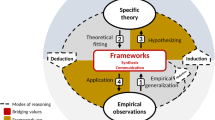Abstract
Implementation, from which flows operational policy, is an integral part of the policymaking process. This phenomenon is examined briefly as a socio-political process, an administrative task, a follow-on from systematic analysis, a problem in the diffusion and utilization of knowledge, and a basic capacity which is differentially distributed among organizations and subject to deliberate change. A three-dimensional framework for assessing the nature of implementation tasks and for making strategic choices in planning implementation is proposed and illustrated. Finally, implementation processes in a federalistic system are described as requiring multi-level participation of four classes of participants: administrative-bureaucratic, political leadership, rational-analytic and constituent elites. A variety of functions must be performed at federal, regional, and local levels to assure policy execution consistent with both policy designs and local contingencies.
Similar content being viewed by others
References
Gergen, K., “Assessing the Leverage Points in the Process of Policy Formation,” in Bauer, R. A. and Gergen, K. H., eds.,The Study of Policy Formation, Ch. 5. New York: The Free Press, 1968.
Jones, C. O.,An Introduction to the Study of Public Policy. Belmont, California: Wadsworth, 1970.
Dror, Y.,Public Policymaking Reexamined. San Francisco: Chandler, 1968.
Gross, B., “Activating National Plans,” in Lawrence, J. R., ed.,Operational Research and the Social Sciences. London: Tavistock, 1966.
Dror, Y., “Prolegoma to the Policy Sciences,”Policy Sciences, 1, No. 1 (Spring 1970).
Dror, Y.,Analytical Approaches and Applied Social Sciences. Santa Monica: Rand Corporation, p. 4248, November 1969.
Ratoosh, P., “Experimental Studies of Implementation,” in Lawrence, J. R., ed.,Operational Research and the Social Sciences. London: Tavistock, 1966.
Archibald, K.,The Use of Analytical Resources. Santa Monica: Rand Corporation, May 1970.
Duffy, N. F. and Taylor, P. M. “The Implementation of a Decision,” in Greenwood, W. T., ed.,Decision Theory and Information Systems. Cincinnati: Southwestern, 1969.
Churchman, C. W. and Schainblatt, A. H., “PPB: How Can It Be Implemented?,”Public Administration Review, XXIX, No. 2 (March–April 1969), pp. 178–189.
Biderman, A., “Information, Intelligence, Enlightened Public Policy: Functions and Organization of Societal Feedback,”Policy Sciences, 1, No. 2 (Summer 1970).
Etzioni, A., “Policy Research.” Mimeo, 1970.
Ilchman, W. F. and Uphoff, N. T.,The Political Economy of Change. Berkeley: University of California Press, 1969.
Author information
Authors and Affiliations
Additional information
Revision of a paper delivered to American Association for the Advancement of Science, 138th Meeting, Chicago, Illinois, December 27, 1970.
Rights and permissions
About this article
Cite this article
Bunker, D.R. Policy sciences perspectives on implementation processes. Policy Sci 3, 71–80 (1972). https://doi.org/10.1007/BF01405218
Issue Date:
DOI: https://doi.org/10.1007/BF01405218




